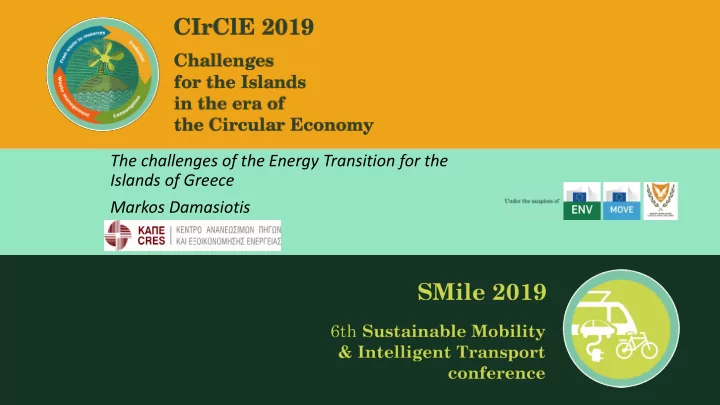

The challenges of the Energy Transition for the Islands of Greece Markos Damasiotis
Two main Interconnections of Non challenges of Interconnected Islands the Energy Transition for Intelligent and Energy Islands the Greek Islands
Electricity system of Greek islands • Current situation There are almost 6.000 islands in Greek Seas most of them in Aegean and most of them inhabited. • The electricity market of NII consists of thirty-two (32) autonomous systems. Some of them consist of several islands (islands’ clusters), where in charge of the operation and management of the relevant Markets and networks is the Hellenic Electricity Distribution Network Operator (HEDNO S.A.) • The size (peak demand) – Nineteen (19) "small" autonomous systems with peak demand up to 10 MW. – Eleven (11) "average size" autonomous systems with peak demand from 10 MW to 100 MW. – Two (2) "large" autonomous systems with peak demand exceeding 100 MW, i.e. Crete (with peak demand over 600 MW) and Rhodes (peak demand~ 200 MW). • Oversizing of power plants / pollution from oil / black outs during summer periods / expensive electricity systems Energy Mix / Electricity Cost 80 % oil – 20% res ~ 250 € /Μ Wh
Interconnection of Non Interconnected Islands Intelligent and Energy Islands (NII) • • Maximum exploitation of insular RES Electrification of naval and road transportations • the Interconnection of NII islands among them and Installation of charging stations using RES Challenges • then to the continental system makes feasible the Energy Storage • exploitation of the vast wind potential of the Aegean Renewable Energy Sources (wind, pv, geothermal) • Sea Energy Efficiency • • Greener islands Energy storage • • Improved energy security Microgrids / Demand response systems • • Independence from imported oil and the fluctuation of Greener islands • oil prices Improved energy security / Independence from imported oil and the fluctuation of oil prices / Decrease of electricity bills charges • Decrease of electricity bills charges imposed by Public imposed by Public Services Obligations Services Obligations levy on electricity bills currently used to fund the costs of certain services that the State deems essential to; reduce emissions of greenhouse gases to meet national targets for emissions reductions, secure supply of electricity, and promote the development and use of indigenous sources of energy - PSO, ~ €600 -800 million/ year, oil prices dependent (source RAE) • The Operator of the Hellenic Electricity Transmission Examples • System, (ADMIE) has already planned the Agios Efstratios (CRES ), Tilos (Technological Education Institute of Piraeus + 15 European partners) , Ikaria (wind + water pumping interconnection of Cyclades to the continental system and storage ) • • The interconnection of Crete is also under planning Kastelorizo, Simi, Astipalea (Hellenic Electricity Distribution Network Operator – HEDNO / ΔΕΔΔΗΕ has the possibility to Plan s implement specific pilot projects for maximum exploitation of RES ) • Cost: 4-5 billion Euros Initiative ‘Energy Islands’ Ministry of Environment and Energy in constant contact with the Directorate General for energy of the European Commission, for drawing up a list of criteria, as well as the candidate Islands to join the program • Pilot hybrid plants for Karpathos and Gavdos (PPC) • Exploitation of geothermal fields of Nisyros, Lesvos and Milos - Kimolos- Polyaigos complex and exploitation of waste.
• Agitos Efstratios (Ai Stratis) Intelligent + Green Island • RES Hybrid System • 1,0 MW RES power plant, WT 800-900 kW, PV 150-250 kW • BESS 1 MW/2,5 MWh • Grid interconnection infrastructure • District Heating (D.H.) • D.H. plant (electricity-to-heat units + back up thermal unit) • Insulated hot water storage tanks • Distribution network and consumer substations • Demonstration of RES charged electrical vehicles • Upgrading the energy efficiency of all municipal buildings • Results • High RES penetration (>80%) in the electricity system • Yearly reduction of GHG equal to 1,25 kt CO2eq
Th Thank ank yo you u fo for r yo your ur at attention tention Markos DAMASIOTIS Electrical Engineer, MSc NTUA Head of Development Programmes Division +302106603325/328, mdamas@cres.gr
Recommend
More recommend